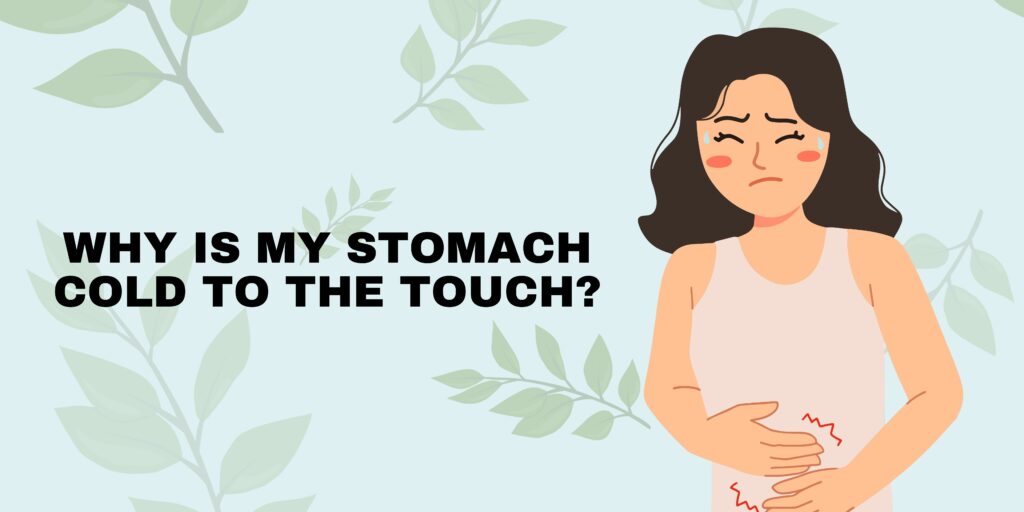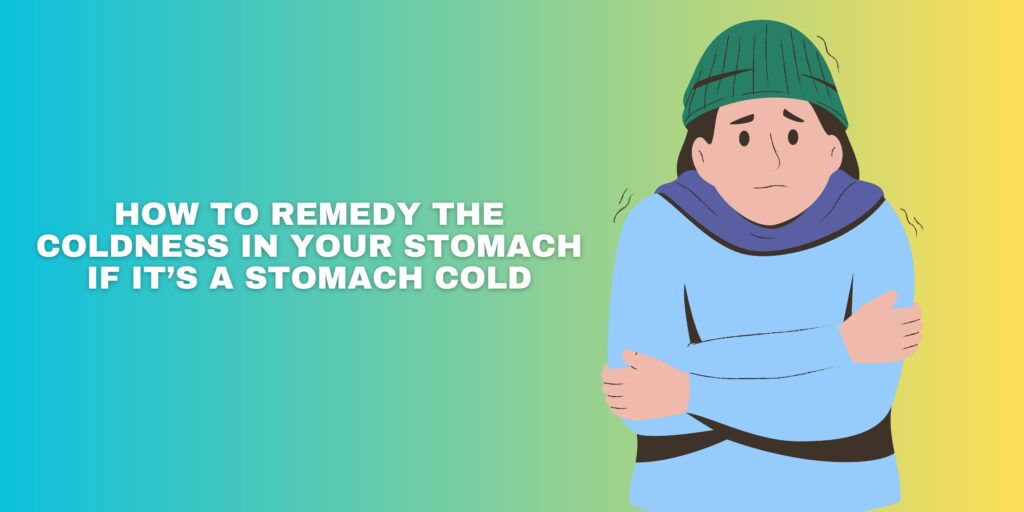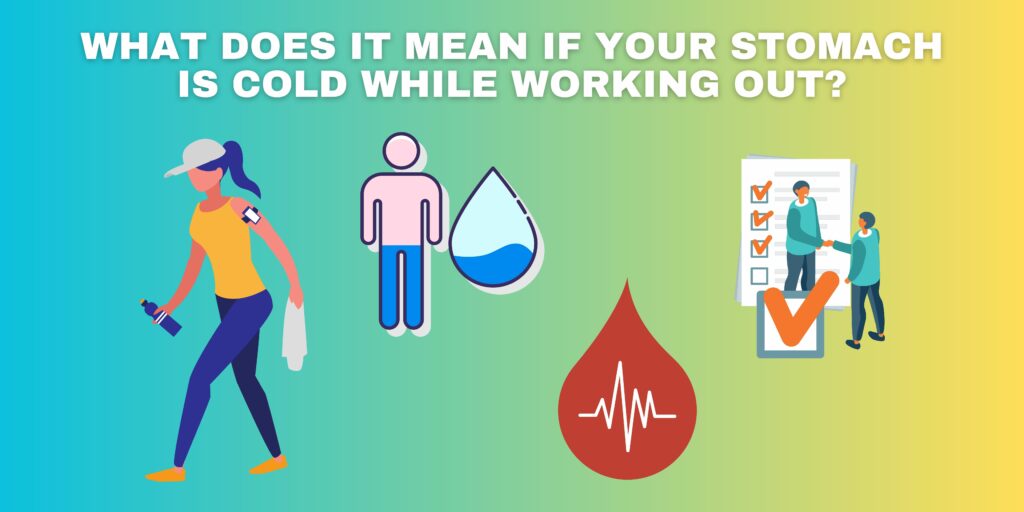
If you’ve ever experienced your stomach feeling cold to the touch, you may have wondered why it’s happening. There are several potential reasons for this sensation, and in this article, we’ll explore some of the possible causes.
Possible Reasons Why Your Stomach Feels Cold to the Touch
- Cold Weather: One of the most common reasons why your stomach may feel cold to the touch is simply because of the temperature outside. When it’s cold outside, your body may conserve heat by directing blood flow away from the skin and towards your internal organs, including your stomach. As a result, your skin may feel colder than usual, especially if you’re not wearing enough layers to protect yourself from the cold.
- Anxiety: Another possible reason why your stomach may feel cold to the touch is due to anxiety. Anxiety can trigger the fight-or-flight response, which causes your body to redirect blood flow away from your digestive system and towards your muscles. This can cause your stomach to feel cold and even cause other digestive symptoms like nausea, diarrhea, or constipation.
- Poor Circulation: Poor circulation is another possible cause of a cold stomach. If your body isn’t circulating blood effectively, it can result in cold skin, especially in the extremities. This may be due to a medical condition, such as peripheral artery disease or Raynaud’s disease, or lifestyle factors like smoking, inactivity, or sitting for long periods.
- Menopause: Menopause can also cause a cold sensation in the stomach. During menopause, the body experiences hormonal changes that can affect blood flow and temperature regulation. This can cause your skin to feel colder, including your stomach area.
- Hypothyroidism: Hypothyroidism is a condition in which the thyroid gland doesn’t produce enough thyroid hormones. This can lead to a variety of symptoms, including fatigue, weight gain, and cold skin. If you’re experiencing a cold stomach along with other symptoms of hypothyroidism, it’s important to see a doctor for diagnosis and treatment.
In conclusion, there are several potential reasons why your stomach may feel cold to the touch. If you’re concerned about this symptom or if it’s accompanied by other symptoms like pain, fever, or vomiting, it’s important to see a doctor for evaluation. Your doctor can help determine the underlying cause of your symptoms and recommend appropriate treatment.
What is a stomach cold and your chances of having it?
If you’ve ever experienced a sensation of your stomach feeling cold, you may have wondered what it is and whether you’re at risk of developing it. In this article, we’ll explore what a stomach cold is and what factors may increase your chances of experiencing it.
What is a Stomach Cold?
A stomach cold is not a medical diagnosis, but rather a term used to describe a sensation of coldness in the stomach or abdominal area. This sensation may be felt on the surface of the skin, making the stomach feel cold to the touch, or it may be an internal sensation that you feel without any external signs.
Factors That May Increase Your Chances of Having a Stomach Cold
- Cold Weather: As mentioned earlier, one of the most common causes of a stomach feeling cold is exposure to cold temperatures. If you’re not dressed appropriately for the weather, your body may conserve heat by redirecting blood flow away from the skin and towards your internal organs, causing your stomach to feel cold.
- Anxiety: Anxiety can also trigger a sensation of a cold stomach. When you’re anxious, your body releases stress hormones that can cause blood flow to be redirected away from the digestive system and towards the muscles, which can result in a cold sensation in the stomach.
- Poor Circulation: Poor circulation, which can be caused by medical conditions or lifestyle factors, can also increase your chances of experiencing a stomach cold. If your body isn’t circulating blood effectively, it can lead to a sensation of coldness in the stomach and other parts of the body.
- Menopause: Menopause can also increase your risk of experiencing a stomach cold. Hormonal changes during menopause can affect blood flow and temperature regulation, leading to a sensation of coldness in the stomach area.
- Hypothyroidism: Hypothyroidism, a condition in which the thyroid gland doesn’t produce enough thyroid hormones, can also increase your risk of experiencing a stomach cold. Other symptoms of hypothyroidism include fatigue, weight gain, and sensitivity to cold.
In conclusion, a stomach cold is a term used to describe a sensation of coldness in the stomach area. Factors that may increase your chances of experiencing a stomach cold include exposure to cold temperatures, anxiety, poor circulation, menopause, and hypothyroidism. If you’re concerned about a cold sensation in your stomach or any other symptoms, it’s important to see a doctor for evaluation and treatment.
What is causing your stomach to be cold?
If you’re experiencing a sensation of your stomach feeling cold to the touch, it can be uncomfortable and concerning. In this article, we’ll explore some potential causes of a cold stomach and what you can do to address it.
Possible Causes of a Cold Stomach
- Raynaud’s disease: Raynaud’s disease is a condition that causes blood vessels in the hands and feet to narrow, which can reduce blood flow and cause a sensation of coldness. This condition can also affect other parts of the body, including the stomach area.
- Hypothyroidism: Hypothyroidism is a condition in which the thyroid gland doesn’t produce enough thyroid hormones. This can lead to a variety of symptoms, including fatigue, weight gain, and cold skin. A cold sensation in the stomach area may be a symptom of hypothyroidism.
- Anxiety: Anxiety can trigger the fight-or-flight response, which causes your body to redirect blood flow away from your digestive system and towards your muscles. This can cause your stomach to feel cold and even cause other digestive symptoms like nausea, diarrhea, or constipation.
- Menopause: During menopause, the body experiences hormonal changes that can affect blood flow and temperature regulation. This can cause your skin to feel colder, including your stomach area.
- Poor Circulation: Poor circulation is another possible cause of a cold stomach. If your body isn’t circulating blood effectively, it can result in cold skin, especially in the extremities. This may be due to a medical condition, such as peripheral artery disease or lifestyle factors like smoking, inactivity, or sitting for long periods.
How to Address a Cold Stomach
If you’re experiencing a cold sensation in your stomach, there are several steps you can take to address it:
- Dress warmly: If you’re experiencing a cold stomach due to exposure to cold temperatures, it’s important to dress warmly and protect yourself from the cold.
- Manage anxiety: If your cold stomach is due to anxiety, managing your stress and anxiety levels can help reduce symptoms. Consider techniques like deep breathing, meditation, or therapy to help manage anxiety.
- Improve circulation: Improving circulation can also help reduce a cold sensation in the stomach area. Exercise regularly, avoid sitting for long periods, and consider seeing a doctor for evaluation and treatment if you have underlying medical conditions that affect circulation.
- Treat underlying conditions: If your cold stomach is due to an underlying medical condition like hypothyroidism or Raynaud’s disease, it’s important to see a doctor for diagnosis and treatment.
In conclusion, there are several potential causes of a cold sensation in the stomach area, including Raynaud’s disease, hypothyroidism, anxiety, menopause, and poor circulation. If you’re experiencing a cold stomach, taking steps to address the underlying cause and protect yourself from the cold can help reduce symptoms and improve your overall health.
How to remedy the coldness in your stomach if it’s a stomach cold

If you’ve been experiencing a cold sensation in your stomach, you may be wondering how to remedy this uncomfortable feeling. In this article, we’ll explore some remedies for a stomach cold and what you can do to alleviate the symptoms.
- Apply heat: One of the most effective remedies for a cold stomach is to apply heat. This can be done by using a heating pad or taking a warm bath. The heat helps to increase blood flow and promote relaxation, which can help alleviate the cold sensation.
- Wear warm clothing: If you’re experiencing a cold stomach, it’s important to dress warmly to protect yourself from the cold. This includes wearing layers, warm socks, and a hat to keep your head warm.
- Drink warm fluids: Drinking warm fluids, such as tea or soup, can help to warm up your body from the inside out. This can also help to alleviate any digestive discomfort that may be contributing to the cold sensation.
- Practice relaxation techniques: If your cold stomach is caused by anxiety or stress, practicing relaxation techniques can help to reduce symptoms. Techniques such as deep breathing, meditation, or yoga can help to promote relaxation and reduce the fight-or-flight response that may be contributing to the cold sensation.
- Improve circulation: Improving circulation can also help to alleviate a cold stomach. This can be done by exercising regularly, avoiding sitting for long periods, and making sure to move around throughout the day. Massage and acupressure can also be helpful in improving circulation.
- Treat underlying conditions: If your cold stomach is caused by an underlying medical condition, such as hypothyroidism or Raynaud’s disease, it’s important to see a doctor for proper diagnosis and treatment. Treating the underlying condition can help to alleviate the cold sensation.
In conclusion, a cold sensation in the stomach area can be uncomfortable and concerning, but there are several remedies that can help alleviate the symptoms. Applying heat, wearing warm clothing, drinking warm fluids, practicing relaxation techniques, improving circulation, and treating underlying conditions are all effective ways to remedy a stomach cold. If your symptoms persist or worsen, it’s important to see a doctor for proper evaluation and treatment.
Why do fat areas of your body feel cold?
If you’ve ever noticed that certain areas of your body, particularly those with more fat, feel colder to the touch, you may be wondering why this happens. In this article, we’ll explore the reasons behind why fat areas of the body feel colder and what you can do to alleviate the discomfort.
- Fat acts as insulation: Fat tissue is a great insulator, which means it helps to keep the body warm by trapping heat. However, this also means that the surface of the skin above the fat can feel colder to the touch since less heat is able to escape.
- Poor blood flow: In some cases, the cold sensation in fat areas may be due to poor blood flow. When blood flow is reduced, less heat is able to reach the surface of the skin, making it feel colder to the touch.
- Underlying medical conditions: In some cases, the cold sensation in fat areas may be a symptom of an underlying medical condition such as hypothyroidism, Raynaud’s disease, or peripheral artery disease. These conditions can affect blood flow and metabolism, which can lead to colder body temperatures.
- Cold weather: During colder weather, the body naturally conserves heat by reducing blood flow to the skin and extremities. This can result in a cold sensation in fat areas of the body, such as the stomach, thighs, and buttocks.
- Weight loss: If you’ve recently lost weight, you may notice that the fat areas of your body feel colder. This is because when fat cells shrink, there is less insulation and less heat production, which can make the skin feel colder.
In conclusion, the cold sensation in fat areas of the body is a common occurrence that can have a variety of causes. Understanding the reasons behind this sensation can help alleviate any discomfort and ensure that any underlying medical conditions are addressed. If you’re concerned about the coldness in your stomach or other fat areas of your body, it’s important to speak with a doctor to rule out any underlying conditions and determine the best course of treatment.
What does it mean if your stomach is cold while working out?

If you’ve ever experienced a cold sensation in your stomach while working out, you may be wondering what this means and whether it’s something to be concerned about. In this article, we’ll explore the reasons behind why your stomach may feel cold during exercise and what you can do to alleviate any discomfort.
- Blood flow: During exercise, blood flow increases to the muscles to provide them with oxygen and nutrients. However, this also means that blood flow may be reduced to other areas of the body, such as the stomach, which can result in a cold sensation.
- Dehydration: When the body is dehydrated, blood flow can be reduced to the skin, which can make it feel cold to the touch. It’s important to stay hydrated during exercise to ensure proper blood flow and prevent dehydration-related discomfort.
- Clothing: Wearing clothing that is too thin or allows for excessive air flow can contribute to a cold sensation in the stomach during exercise. Wearing layers or choosing clothing specifically designed for exercise can help regulate body temperature and prevent discomfort.
- : In some cases, a cold sensation in the stomach during exercise may be a symptom of an underlying medical condition such as Raynaud’s disease or peripheral artery disease. If this sensation is persistent or accompanied by other symptoms, it’s important to speak with a doctor to rule out any underlying medical conditions.
- Overexertion: Overexerting the body during exercise can lead to a decrease in body temperature and a sensation of coldness. It’s important to listen to your body and take breaks as needed to prevent overexertion and related discomfort.
In conclusion, a cold sensation in the stomach during exercise can have a variety of causes, including reduced blood flow, dehydration, clothing choices, underlying medical conditions, and overexertion. By understanding the reasons behind this sensation, you can take steps to prevent discomfort and ensure that any underlying medical conditions are addressed. If you’re concerned about a persistent cold sensation in your stomach during exercise, it’s important to speak with a doctor to determine the best course of treatment.
Conclusion
In conclusion, experiencing a cold sensation in your stomach can be a disconcerting and uncomfortable experience, but it can be caused by a variety of factors. In this article, we explored the different reasons why your stomach may feel cold to the touch, including cold weather, anxiety, medical conditions, exercise, and more. By understanding these causes, you can take steps to prevent and treat this sensation.
If you’re experiencing a persistent cold sensation in your stomach, it’s important to consult with a healthcare professional to determine the underlying cause. Depending on the cause, they may recommend lifestyle changes, medication, or other treatments to alleviate your symptoms.
Whether your cold stomach sensation is caused by anxiety, cold weather, or medical conditions like Raynaud’s disease, there are several things you can do to alleviate your symptoms. These include wearing warm clothing, practicing relaxation techniques like deep breathing or meditation, and staying hydrated.
If you’re experiencing a cold sensation in your stomach during exercise, it’s important to pay attention to your body and take breaks as needed. Wearing appropriate clothing, staying hydrated, and understanding the signs of overexertion can also help prevent this sensation from occurring.
In conclusion, while a cold sensation in your stomach can be uncomfortable, it is often a manageable symptom that can be treated through a combination of lifestyle changes and medical treatments. If you’re concerned about your symptoms, speak with a healthcare professional to determine the underlying cause and develop an effective treatment plan. By taking proactive steps to address this symptom, you can improve your quality of life and prevent further discomfort.